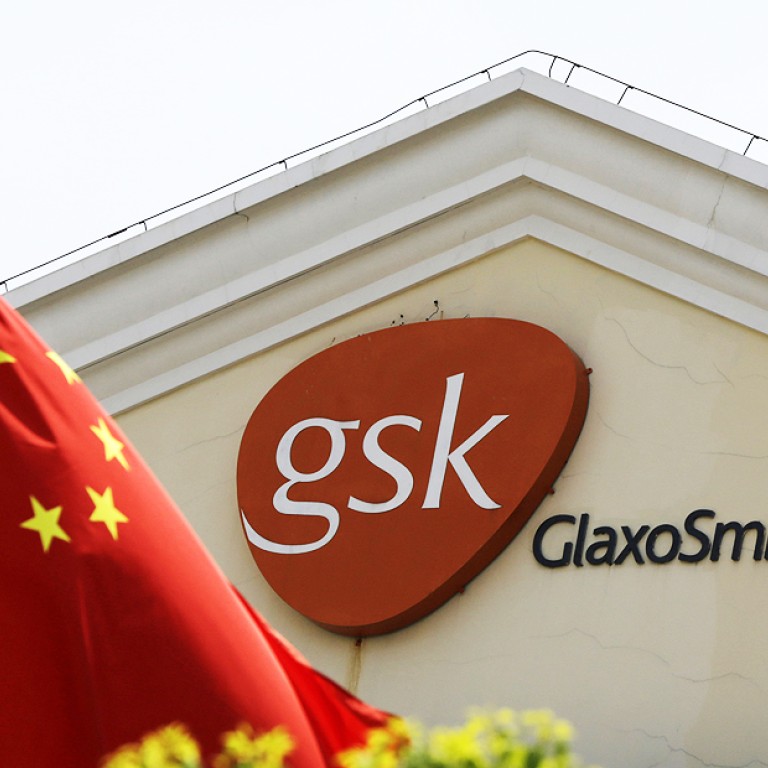
GlaxoSmithKline boss insists he has ‘zero tolerance’ of bribery
Pharmaceutical firm led by Andrew Witty sees profits drop to 1.3 billion pounds overall, with 129 million pound fall in China, site of bribery claims against GSK
The chief of British pharmaceutical giant GlaxoSmithKline, Andrew Witty, reiterated on Wednesday that his company had a “zero tolerance” attitude to the corrupt sales practices it is being accused of in China and other countries.
Witty, who is battling to repair GSK’s corporate reputation, was speaking as Britain’s largest drugmaker announced a 14 per cent fall in second-quarter profits to 1.3 billion pounds (HK$17.2 billion), missing analysts’ forecasts.
GSK’s shares fell nearly 5 per cent to 14.81 billion pounds, the biggest drop on the FTSE 100 stock index. Profits were hit by competition from generic products and the UK’s strong currency. The firm now expects full-year earnings per share to be similar to last year.
In China, where GSK has been rocked by serious bribery allegations since last summer, sales continued to fall, dropping 25 per cent to 129 million pounds in the second quarter. Chinese authorities are investigating claims that GSK’s sales reps paid doctors and health officials up to 3 billion yuan to push the company’s drugs. The China scandal knocked four percentage points off GSK’s otherwise stellar sales growth in emerging markets for the latest quarter. GSK staff have also been accused of bribing doctors in Poland, Iraq, Jordan and Lebanon.
Witty said: “I remain very concerned about allegations concerning our China business. The situation is complicated and difficult and while the investigation is active there is little I can add.” He said the allegations were “contrary to the values” he believed in. “In a company of our size operating in almost every country in the world there’s always a small potential for some people to step outside procedure,” Witty said. “This isn’t acceptable, and where we are aware of misconduct, we take action including dismissal from the company.” He added that the company had changed the way it did business, including “how we reward our sales representatives, and stopping payments to doctors to speak on our behalf or to attend medical congresses”.
ast week GSK admitted it had dismissed staff in China in 2001 for bribing health officials. Britain’s Serious Fraud Office (SFO) recently began a criminal investigation into the drugmaker’s sales practices around the world and said yesterday that it was working with the Chinese authorities for the first time ever.
SFO head David Green told reporters the Chinese government had a clear interest in rooting out bribery and corruption, though it might have “slightly different perspectives” from the SFO. The US department of justice is also investigating GSK for possible breaches of the foreign corrupt practices act.

Peter Humphrey and Yu Yingzeng, who ran a Shanghai corporate investigation consultancy for foreign firms operating in China, were hired by GSK last year to investigate a break-in after a video of the company’s former China boss, Mark Reilly, having sex with his girlfriend in his Shanghai home was emailed anonymously to 13 GSK executives, including Witty. The whistleblower sent other emails containing allegations of fraud. Reilly has been accused by Chinese authorities of running a “massive bribery network”.
GSK hired Humphrey’s firm ChinaWhys to investigate the “serious breach of privacy and security” relating to Reilly rather than the allegations themselves. GSK’s internal investigations have not found any evidence of widespread fraud.
Despite the problems in China, emerging markets put in a strong performance, with GSK sales up 11 per cent , which partially offset declines in Japan and the US of 7 per cent and 10 per cent respectively. European sales were flat. Turnover in the second quarter fell 4 per cent to 5.6 billion pounds.
